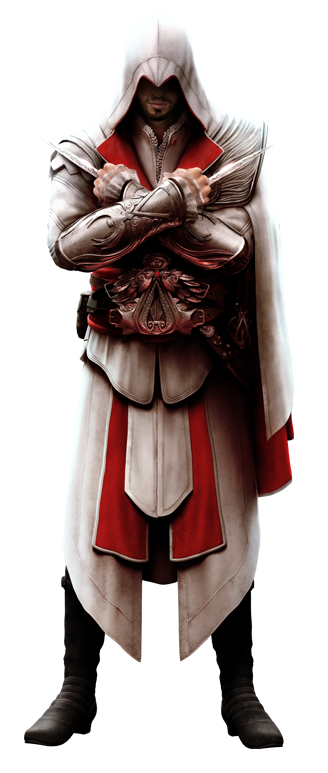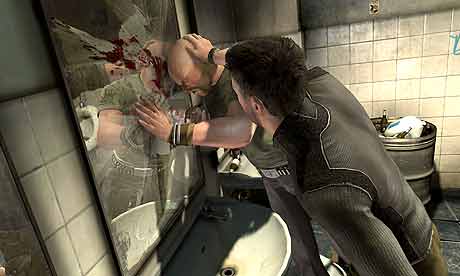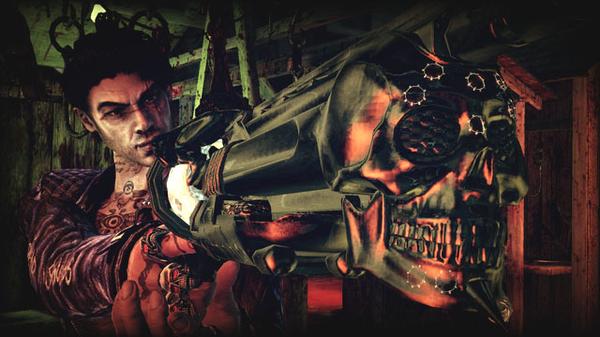7) Ezio Auditore de Firenze
 |
| Maximum Swagger |
Assassin's Creed was an OK game. It had some fantastic ideas, but terrible execution: the game was overly repetitive, and the narrative lacked heart and emotion. This latter idea was especially prominent in the game's main character, Altair. Now, Altair was a perfect Assassin: cold-blooded and unemotional. But while this might have worked to establish what an Assassin should be, he completely failed to be an interesting character. Like Hitman's Agent 47, Altair was like a brick wall, effective but completely void of all potential emotional attachment for the character. Oh sure, you could talk about how badass the characters are, but you could never truly connect with someone who never cracks a smile or expresses any other emotion than anger.
 \ \ |
| I hope you like this serious face, because it will be the only thing you will ever see. |
Ezio, on the other hand, was more human in the fact that he actually expressed emotion. He was witty, sarcastic, and sometimes even a little bit stupid and gullible. Observe:
(Yes, I know this isn't from AC II, but I just love this moment.)
But it is in these moments that we grow to love Ezio. He makes us laugh with his wit and his ignorance, and we find that he is a person we would love to hang out with. Thus, in the game's opening acts, when everything is fine and dandy, the game builds this connection so when bad things eventually happen, we sympathize with him more readily. We are more willing to care about his evolution into an assassin in revenge for his family's murder. This is proper story telling and attachment.
 |
| Ezio is pleased with your shenanigans. (Found on Funnyjunk.com, Origin Unknown) |
 |
| Ezio's response whenever someone says Altair was the better protagonist. (Courtesy of icanhascheezburger.com) |
Assassin's Creed II had a lot going for it, including a better narrative, likable characters, less repetitive gameplay, better climbing, and so on. But the main advantage over its predecessor rested in everyone's favorite Italian history changer. The players connected with him more at an earlier time, and thus the game becomes more interesting from the get-go. The fact that he had two more games dedicated to him shows quite clearly how much Ubisoft and the fans adored Mr. Auditore.
6) Ethan Thomas (Specifically in Condemned 2: Bloodshot)
 |
| Yes, this hobo is your protagonist. And I LOVE it. |
WARNING: SPOILERS AHEAD
The Condemned series has always interested me, not just because you beat up hobos with pipes. The game features fantastic CSI moments and genuinely terrifying moment and environments. Condemned 2: Bloodshot has received a lot of criticism for its silly plot involving cults that completely ruined the mystery and scariness of the random hobo attacks. As Benjamin "Yahtzee" Croshaw mentioned in his review of Condemned 2:
"In Condemned 1 it's never explained why the homeless all went kill crazy, and the fact that it was unexplained exacerbated the creepiness. In Condemned 2 it's explained on the first fucking level. Some prick nailed noisy hubcaps to the walls that were keeping everyone awake. Thanks, Condemned 2, I was almost getting intrigued. This isn't rocket science. Mysteries lose all their appeal the instant you explain them. This is why they never explained why Scully never got it on with Mulder, besides the fact that he had the charisma of a cardboard cut-out with a bag of sick taped to it."
Harsh language aside, the point is made, and I agree with it completely. But the interesting thing about Condemned 2's protagonist, Ethan Thomas, is that his drunken personality and life in squalor might actually offer an explanation for the game's horrible story.
Ethan Thomas is a former FBI agent who fell into drink and squalor after the Case of Serial Killer X. Long story short, SKX (aka Malcolm Vanhorn) was a serial killer who killed other serial killers by using their own M.O.s against them. The experience tested Thomas's sanity and commitment to the job, and reached a bloody and unsatisfying conclusion.
But the game reaches an interesting point at the beginning of Condemned 2. By this time, Ethan begins hallucinating not only his alcoholism as a masked man (which is a pretty serious symptom in itself), but also begins hallucinating entire levels of the game! That amazed me during my play though. The fact that the game could not even be occurring in real life made me question Ethan's reliability as a first person narrator. If he hallucinated entire portions of the game, how could we be sure that any of the game was true? Is it possible that entire game was merely an hallucination of Ethan's alcohol fueled mind?
 |
| If your main character sees this guy on a regular basis, you can assume that something is wrong with him. |
If one looks at the context of all the "reveals" of Condemned 2's plot, one might just see the horrible rationalization of a man just looking for reason and meaning in his shitty life. By forming the Alcohol Demon as a separate entity, Ethan forms the common rationalization of an addict by thinking that his alcoholism is something separate from him and something that he can simply defeat by just beating the hell out of it in a fist fight. By having Leland Vanhorn (SKX's uncle) reveal that Ethan is actually a superhuman and his parents died trying to protect Ethan from some bizarre cult might have been a rationalization of Ethan's inability to explain his parents death, and to give meaning to his life . The idea that the hobo attacks are caused by some sonar hubcaps might be an attempt to explain the hobo violence, which Ethan was never able to explain. The fact that SKX survived a gunshot to the goddamn face in the first game might reflect Ethan's inability to let go of the SKX case. Even the the fact that his former agency found him in order to solve a case he had no reason to be involved with might reflect Ethan's desire to get back to his former, "normal" life. Everything becomes an object of study. Ethan's unreliability as a narrator becomes a central point of the game's plot, if not the plot itself.
 |
| You saying I'm crazy? Well, I'll beat the shit out of you with a pipe to prove that you're wrong! (Courtesy of Photobucket) |
Of course, this is just speculation. I doubt even the game's creators thought this way. But the fact that Ethan's romps could just be a reflection of his fractured mind makes the game come alive! It makes even the worst plot imaginable somehow become interesting. I only wish the creator's had played more with the crazy route rather than the cult route. Oh well. He's still got a dope shirt, which can be purchased here:
http://www.spreadshirt.co.uk/t-shirt-C4408A16313388#
5) Daniel (Amnesia: The Dark Descent)
 |
| "Don't be hatin' 'cause I be stylin' on you!" |
But that is not the only reason why I love Daniel. The more we learn about him in his notes and hallucinations, the more we learn how out of his element, and even despicable Daniel is. We learn that he is fleeing from an ancient, Lovecraftian evil that has been following him for years. We learn that Daniel fled to Castle Brennenburg in order to get protection from this evil, and, in order to keep in the good whims of the castle's lord, the obviously-named Lord Brennenburg, Daniel commits the most heinous acts imaginable, including torture and murder. But in these acts, Daniel reflects the horrible things a person will do when he is afraid and in panic. We always try to deny that we would do horrible actions when in a panic, but Daniel, with his rather extreme actions, shows us that we really do become savages when we are caught in a corner and we fear the worst. And that is what draws me to him. The fact that he is used to teach us a lesson about the depravity of man when in a harsh situation makes him become a fascinating character, despite his role as a silent character and empty vessel.








